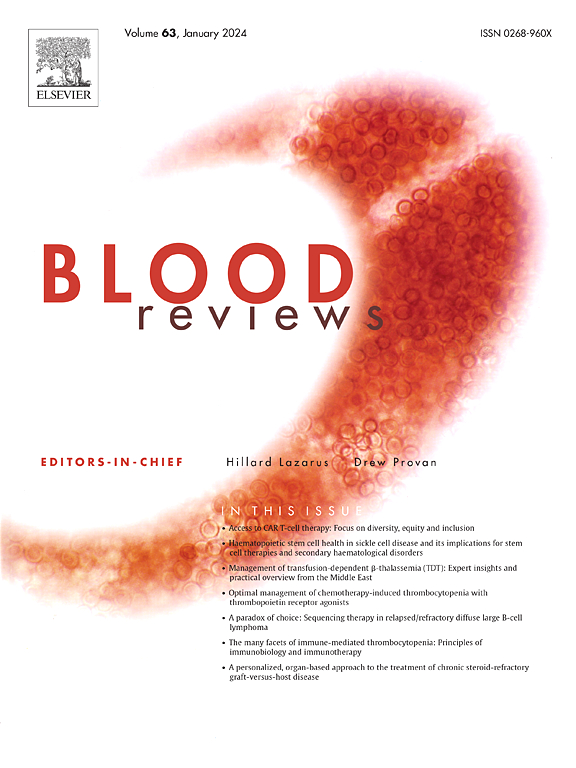慢性淋巴细胞白血病中btki诱导的心血管毒性:风险缓解和管理策略
IF 5.7
2区 医学
Q1 HEMATOLOGY
引用次数: 0
摘要
由布鲁顿酪氨酸激酶抑制剂(BTKis)或BCL-2抑制剂组成的靶向治疗是当代慢性淋巴细胞白血病(CLL)治疗的主流。BTKis最常见的不良反应(ae)是疲劳、瘀伤、感染、血液和心血管不良反应。虽然治疗期间的不良事件通常是轻微的(1级和2级),但在一些患者中发现了3级和4级不良事件,需要额外的医疗护理和暂时或永久停药。在这篇综述中,我们分析了与BTKi治疗CLL相关的心血管效应,以及治疗期间发生心血管毒性的患者的多学科管理的基本实践方面。我们特别关注与ibrutinib和新型BTKis (acalabrutinib、zanubrutinib和pirtobrutinib)相关的心血管风险控制数据和策略,包括房颤、高血压、室性心律失常、猝死、心力衰竭、出血和缺血性并发症(中风和心肌梗死)的发展。这篇综述强调了心脏毒性的血液学见解,与主要的心脏病学观点相比,这一领域受到的关注有限。本文综述了血液学生物标志物、心脏毒性机制和治疗干预方面的新证据,将血液学和心脏病学联系起来,以加强理解和指导综合预防和管理策略。本文章由计算机程序翻译,如有差异,请以英文原文为准。
BTKi-induced cardiovascular toxicity in CLL: Risk mitigation and management strategies
Targeted therapies, consisting of Bruton tyrosine kinase inhibitors (BTKis) or BCL-2 inhibitors, are the mainstay of contemporary treatments for chronic lymphocytic leukemia (CLL). The most common adverse effects (AEs) of BTKis are fatigue, bruising, infection, hematological and cardiovascular AEs. While AEs during treatment are usually mild (grades 1 and 2), grade 3 and 4 AEs have been detected in some patients, necessitating additional medical care and temporary or permanent drug discontinuation. In this review, we analyzed the cardiovascular effects associated with BTKi therapy for CLL and the essential practical aspects of multidisciplinary management of patients who develop cardiovascular toxicity during treatment. We particularly focus on the data and strategies for controlling cardiovascular risks associated with ibrutinib and newer BTKis (acalabrutinib, zanubrutinib and pirtobrutinib), including the development of atrial fibrillation, hypertension, ventricular arrhythmias, sudden death, heart failure, bleeding, and ischemic complications (stroke and myocardial infarction). This review highlights hematological insights underlying cardiotoxicity, an area that has received limited attention in comparison to the predominantly cardiological perspective. This review synthesizes emerging evidence on hematological biomarkers, cardiotoxic mechanisms, and therapeutic interventions, linking hematology and cardiology to enhance understanding and guide comprehensive prevention and management strategies.
求助全文
通过发布文献求助,成功后即可免费获取论文全文。
去求助
来源期刊

Blood Reviews
医学-血液学
CiteScore
13.80
自引率
1.40%
发文量
78
期刊介绍:
Blood Reviews, a highly regarded international journal, serves as a vital information hub, offering comprehensive evaluations of clinical practices and research insights from esteemed experts. Specially commissioned, peer-reviewed articles authored by leading researchers and practitioners ensure extensive global coverage across all sub-specialties of hematology.
 求助内容:
求助内容: 应助结果提醒方式:
应助结果提醒方式:


